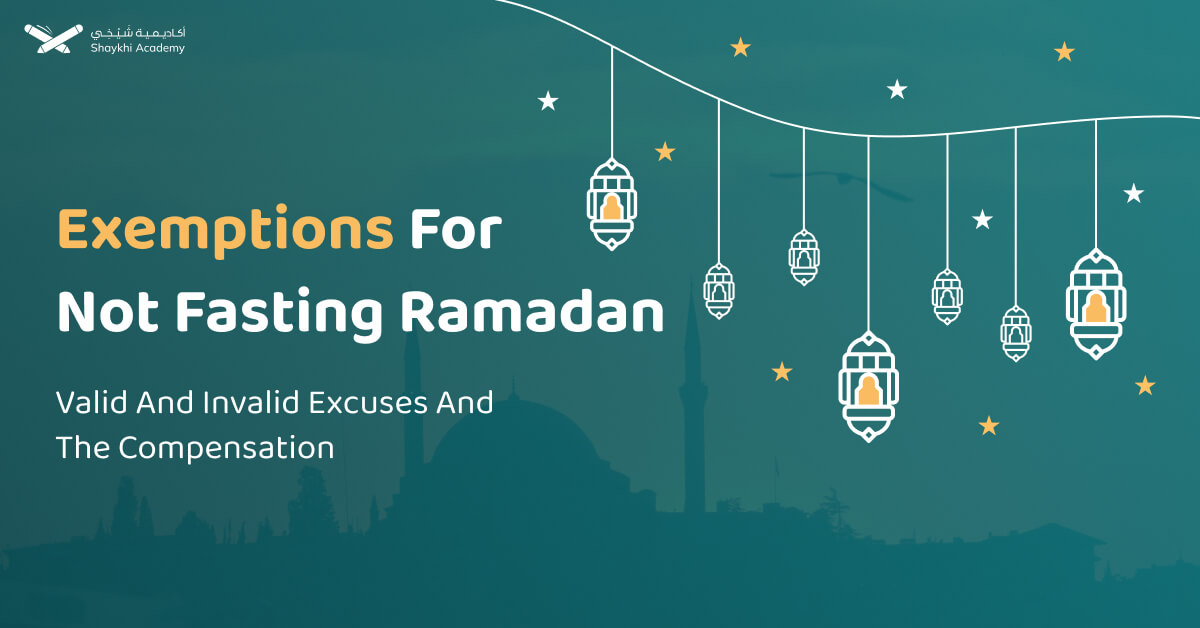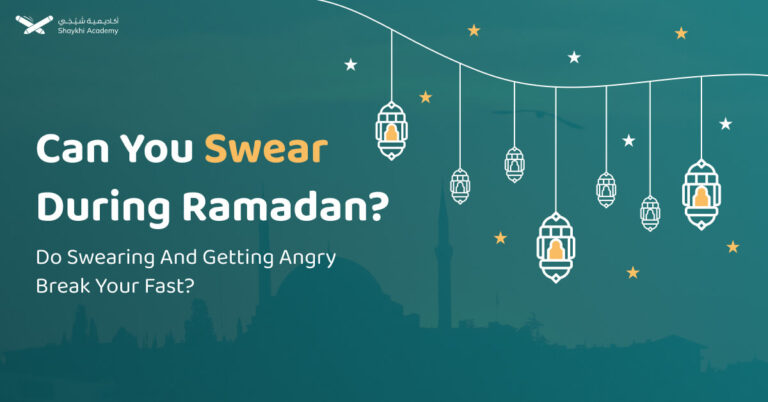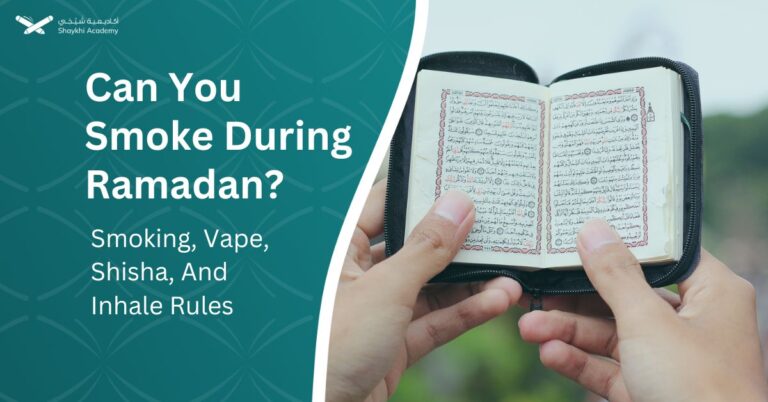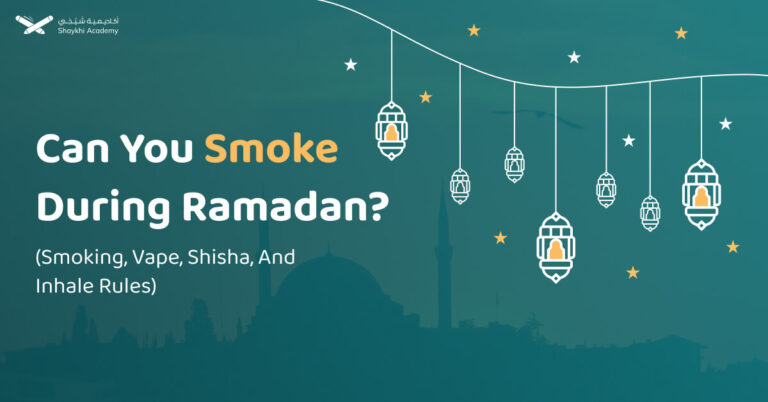In Islam, fasting during Ramadan is obligatory, but there are certain exemptions for Not Fasting Ramadan. the are circumstances that exempt individuals from this duty. Children below the age of puberty, mentally incapacitated individuals, and frail elderly people are exempt.
Likewise, those with illnesses that fasting would worsen, travelers, pregnant women, breastfeeding mothers, and menstruating women are excused. This compassionate approach prioritizes individuals’ well-being while ensuring religious obligations are met. It reflects Islam’s understanding of human needs and its flexibility in accommodating them within religious practice.
What is The Meaning of Exemption For Not Fasting Ramadan?
Exemption For Not Fasting Ramadan refers to the circumstances in Islam that excuse individuals from fasting during the holy month of Ramadan. These exemptions prioritize individuals’ well-being while ensuring religious obligations are met.
Various categories of people are exempted, including children, the elderly, pregnant and breastfeeding women, travelers, and those who are physically or mentally incapable of fasting. This compassionate approach reflects Islam’s understanding of human needs and its flexibility in accommodating them within religious practice.
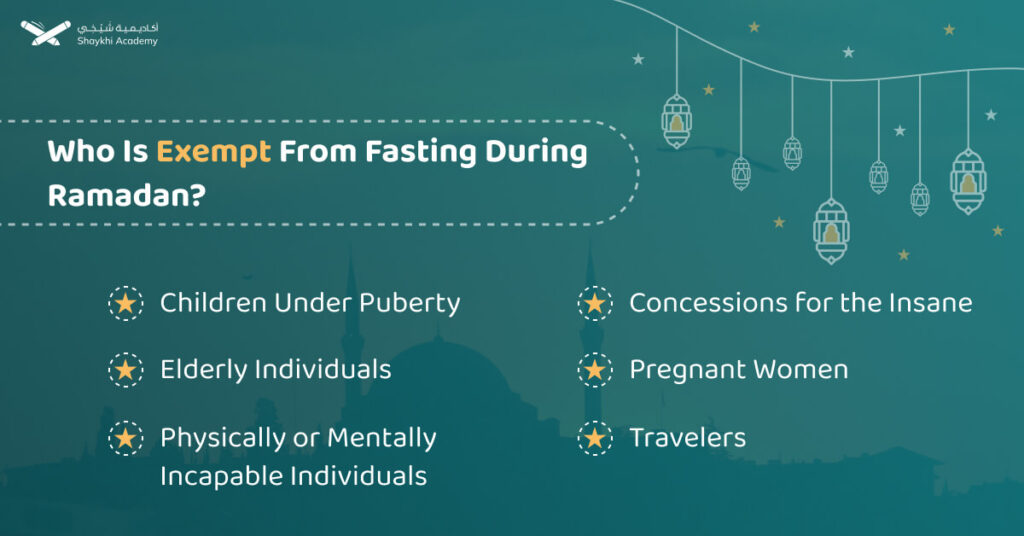
Who Is Exempt From Fasting During Ramadan?
In Islam, those who are exempted from fasting Ramadan. Such as (children, elders, pregnant women, breastfeeding mothers, travelers) read the following for more details about the valid exemptions for not fasting:
1. Children Under Puberty
Children under the age of puberty are not obliged to fast until they reach approximately 11 or 12 years old. While they do not fast, they may join in celebratory meals in the evenings and observe fasting adults during the day.
2. Elderly Individuals
Elderly individuals who have become extremely weak due to old age are permitted to forgo fasting. According to a narration from Ibn Abbas, elders have been granted permission to break their fast during Ramadan and feed a poor person for each missed day, without the obligation to make up the fast later.
Ikramah reported: ibn Abbas, may Allah be pleased with him said:
”elders have been given a concessionto break their fast in Ramadan and to feed a poor person for each day, without need to make it up later.
رخص للشيخ الكبير أن يفطر (يعنى في رمضان) ويطعم عن كل يوم مسكينا ولا قضاء عليه “
3. Physically or Mentally Incapable Individuals
Those who are physically or mentally incapable of fasting are exempt from fasting. This includes individuals with chronic illnesses or mental health conditions for whom fasting may pose a risk to their well-being.
Read also about the Ramadan medication rules.
4. Concessions for the Insane
Insane individuals are not obligated to fast, as fasting may worsen their condition or lead to harm. Similarly, individuals with chronic illnesses who do not expect to recover are not required to make up missed fasts.
5. Pregnant Women
Pregnant women are granted concessions in fasting during Ramadan. If a woman feels that fasting would harm her fetus or pose a danger to her own health, she is permitted to break her fast. In this case, she is only required to make up for the missed fast days later.
This ruling applies similarly to a sick person who is not physically strong enough to fast or fears for their well-being.
6. Breastfeeding Mothers (Lactating Mothers)
Similarly, breastfeeding mothers are allowed to break their fast if they believe that fasting would harm their baby or themselves. They are then obligated to make up for the missed fast days later.
If it becomes difficult for them to make up for the missed days, they can follow the opinion of Ibn Abbas (may Allah be pleased with him) and provide food to one poor person as compensation for each missed fast day (fidyah).
7. Travelers
Travelers are granted leniency in fasting during Ramadan. They are allowed to temporarily break their fast only during their journey and make up for the missed days later, a day for a day. If concerns arise about breaking the fast mid-flight or uncertainty about meal times during travel, travelers have the option not to fast during their journey.
This concession is stated in the Quran:
(Quran 2:185)
“فَمَن كَانَ مِنكُم مَّرِيضًا أَوْ عَلَىٰ سَفَرٍ فَعِدَّةٌ مِّنْ أَيَّامٍ أُخَرَ”
“So whoever among you is ill or on a journey [during them] – then an equal number of days [are to be made up].”
In this verse, Allah Almighty permits those who are ill or on a journey to make up for missed fasts on other days. Additionally, the Prophet Muhammad (peace be upon him) is reported to have said, “Allah has exempted the traveler from the obligation of fasting.”
What Is The Punishment For Not Fasting In Ramadan With No Valid Exemptions?
The punishment for not fasting in Ramadan without a valid excuse is severe in Islam. It is considered a major sin and exposes the individual to the wrath of Allah. Breaking the fast without a legitimate reason is deemed more evil than engaging in adultery or drunkenness.
According to a narration from Ibn Umar, the Prophet Muhammad (peace be upon him) stated that Islam is built upon five pillars, one of which is fasting Ramadan. Therefore, failing to fast in Ramadan without a valid excuse raises doubts about one’s faith and commitment to Islam, leading to questioning of one’s Islamic identity and sincerity.
Evidence of punishment for not fasting in Ramadan:
An authentic narration warning against not fasting in Ramadan is reported by Ibn Khuzaymah from Abu Umamah al-Baahili. In this narration, the Prophet Muhammad (peace be upon him) recounts a dream where two men took him to a rugged mountain.
Despite initial hesitation, the men facilitated his ascent to the mountain’s summit. From there, the Prophet heard the agonizing cries of people. When he inquired about them, he was told they were those who broke their fast before the prescribed time.
Additionally, some of the early Muslim scholars (Salaf) held the view that refraining from fasting in Ramadan without a valid excuse could lead one to be considered a Kaafir, or apostate, highlighting the severity of neglecting this obligation in Islam.
Valid Exemption For Not Fasting Ramadan:
Valid exemptions for not fasting during Ramadan encompass several major categories:
1. Illness:
Sick individuals whose health would be severely affected by fasting are excused. They can postpone their fast to a later date and make up for it, a day for a day. While not every illness or pain legitimizes breaking the fast, if fasting is feared to worsen the sickness, delay recovery, or cause harm to the body, then breaking the fast is permissible.
2. Travel:
Travelers may break their fast under specific conditions:
- Distance: Sufficient distance must be traveled, typically around 50 miles according to most scholars. However, the norm is determined by the standards of the time and place, considering what constitutes a journey.
- Duration: The traveler must not intend to stay at their destination for more than three days. In this case, fasting during travel may be permitted.
- Exceedance: The journey must exceed the limits of the city or town where the individual resides. Merely traveling 50 miles within the same metropolitan or town area does not qualify as travel.
- Intentionality: The purpose of the journey should not be for unlawful reasons or to unlawful destinations, according to the majority of scholars.
3. Young Age:
There is a consensus that elderly individuals are permitted not to fast. While there is no specific definition for old age, it generally refers to an age that is considered very advanced and disabling by societal standards.
4. Severe Thirst and Hunger:
Severe thirst and hunger are valid reasons for not fasting. If an individual genuinely believes that continuing the fast will physically harm them due to severe thirst or hunger, then breaking the fast is permissible.
5. Coercion:
If someone’s well-being is threatened while fasting, such as being told that failure to break the fast will result in punishment or confinement, there is no penalty for breaking the fast under such duress. However, the missed fast must still be made up at a later date.
6, Pregnant women:
Pregnant women are permitted to break their fast if fasting could endanger their health or that of the fetus.
Can I break my fast if I feel weak?
Yes, you can break your fast if you feel weak to the point of vomiting, passing out, or feeling at risk. Islam emphasizes ease and does not want to burden individuals beyond their capacity. As Allah states in the verses of fasting:
“Allah intends for you ease, and He does not want to make things difficult for you”
(Quran 2:185).
Therefore, if fasting poses a severe risk to your health or well-being, it is permissible to break your fast. There is no blame on someone who feels too weak to continue fasting under such circumstances.
What if I am unable to fast during Ramadan?
If you are unable to fast during Ramadan due to health reasons, there are alternative actions you can take to fulfill your religious obligations and gain blessings:
1. Feed the Needy:
Donate food or resources to those in need as instructed by Allah. Identify impoverished individuals or families in your community and provide them with food or financial assistance each day during Ramadan.
2. Prepare Food for Fasting Individuals:
Help those who are fasting by preparing meals or providing them with items to break their fast. The Prophet Muhammad (peace be upon him) taught that whoever facilitates the breaking of a fasting person’s fast will receive a reward equal to that of the fasting person.
3. Engage in Remembrance of Allah:
Spend time in remembrance of Allah, as it brings tranquility to the heart. Reflect on the significance of Ramadan and engage in prayers and supplications.
4. Recite Selawat:
Recite blessings and prayers upon the Prophet Muhammad (peace be upon him), known as Selawat, to seek Allah’s pleasure and blessings.
5. Charitable Giving (Sadaqah):
Ramadan is a month of increased generosity and charity. Take advantage of this blessed time to give generously to those in need and earn multiplied rewards from Allah.
By engaging in these alternative actions, individuals who are unable to fast due to health reasons can still participate in the spiritual benefits of Ramadan and fulfill their religious duties.
What is the compensation for not fasting during Ramadan?
The compensation for individuals unable to fast during Ramadan varies depending on their circumstances:
1. Feeding the Needy:
Those incapable of fasting due to reasons such as old age, illness, or pregnancy are required to feed a poor person for each day of fasting missed. This compensation ensures that those unable to fulfill the fasting obligation can still contribute to the welfare of others. It is preferable to directly provide food to deserving individuals, either by giving dry rations or cooked meals.
2. Exemption for the Needy:
Elderly, sick, or impoverished individuals who cannot afford to pay the fidyah (compensation) are exempt from this requirement. Allah acknowledges the varying capabilities of individuals and does not burden them beyond their means.
3. Making up Missed Fasts:
Young and healthy individuals who miss fasts due to temporary reasons such as travel or sickness are required to make up the missed fasts once their situation improves. In such cases, no fidyah is necessary.
4. Fulfillment of Fidyah:
If providing food directly is challenging, individuals can assign the responsibility to a trustworthy person or organization. However, it is essential to ensure that the fidyah reaches deserving recipients.
5. Distribution of Fidyah:
To ensure equitable distribution, it is recommended to feed ten poor individuals after each ten-day interval of Ramadan. This systematic approach ensures that the compensation reaches those in need effectively.
By adhering to these guidelines, individuals unable to fast during Ramadan can fulfill their religious obligations while also contributing to the welfare of society, thereby earning blessings and forgiveness from Allah.
Unlock the Path to Quranic Mastery with Shaykhi Academy!
Are you seeking the finest Quranic education right from the comfort of your home? Look no further! Shaykhi Academy stands out as a premier online Quran learning platform, dedicated to providing exemplary education to both children and adults.
Why Choose Shaykhi Academy?
- Connect with highly qualified native tutors.
- Flexible scheduling to suit your busy lifestyle.
- Affordable classes tailored for all levels.
- Accessible from anywhere around the globe.
Discover Our Range of Courses:
- Arabic Noorani Qaida: Lay a solid foundation for Quranic studies.
- Online Quran Classes for Kids: Engaging lessons for lifelong learning.
- Tajweed Rules for Kids: Learn to recite with confidence.
- Quran Hifz for Kids: Step-by-step guidance to memorize the Quran.
- Quran for Adults: Introduce yourself to Quran reading and Tajweed rules.
- Online Arabic Courses: Master the language of the Quran.
- Islamic Studies: A wide range of topics related to Islam, including theology, law, Quranic studies, Hadith.
Don’t Miss Out on Your Chance to Excel!
Whether you’re a beginner or seeking advanced knowledge, Shaykhi Academy can guide you! Book your free trial now and make Ramadan 2024 your Quranic turning point!
Conclusion:
In conclusion, exemptions for not fasting during Ramadan are granted by Islam to accommodate various circumstances that may prevent individuals from fulfilling this religious obligation. These exemptions prioritize individuals’ well-being while ensuring that the essence of Ramadan is upheld.
Valid excuses include being underage, elderly, sick, pregnant, breastfeeding, traveling, or facing extreme hardship. The Quran and Hadith provide guidance on who is exempt from fasting and the appropriate compensation for missed fasts.
The compensation for not fasting during Ramadan involves feeding the needy for each day of fasting missed. This ensures that those unable to fast can still contribute to the community’s welfare. Additionally, exemptions are granted to those who are unable to afford the compensation, ensuring fairness and compassion. Making up missed fasts is also an option for those capable of fasting at a later time. It is essential to fulfill the compensation in a manner that reaches deserving recipients effectively.
